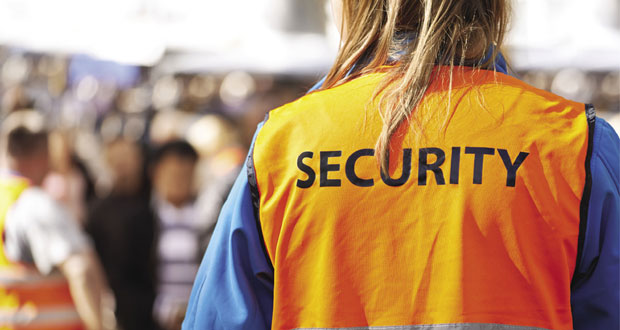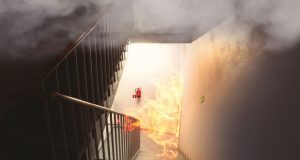FMJ reports on how the manned security sector has evolved to meet the challenges of the past year and how the sector is planning for the future
Over the past year security guards have played key roles at a range of critical settings; including working at testing centres and the NHS Nightingale Hospitals, helping secure essential food deliveries from warehouses and managing queues and customers at supermarkets. As the British Security Industry Association (BSIA) confirms they have also been involved in safeguarding the homeless in new sheltered accommodation, physical security at factories and premises and protecting industrial estates from illegal fly-tipping during lockdown.
Describing the main challenges for security operations during the past year, Tim Isaac, Security Director at 14forty says the security teams met the challenges affecting many of their client organisations, including social distancing restrictions and a drastic increase in the number of buildings left empty and more vulnerable to security threats.
“The unpredictable nature of COVID requires planning, planning and more planning,” he says. “We carried out table top exercises to plan for hypothetical scenarios and always made sure there was a plan B in place – often even a plan C. In some cases, we were able to provide staff with COVID tests, which greatly improved efficiency. We also found support through collaboration and partnerships within the wider security industry.
“We also used our resources to support the NHS and COVID-19 test centres. For us, dealing with this surge in demand and balancing that with reduced levels of staff due to shielding or self-isolation periods was the most difficult obstacle to overcome. The safety of our staff and clients is naturally a top priority for us and we were able to rise to the challenge of ensuring a COVID-secure working environment for all.”
According to Jonathan Moore, Director of Operations at Bidvest Noonan, which acquired UK support services firm Axis Group in late 2020, security professionals are often the first person you meet when visiting a client’s site and under normal conditions, engage with large numbers of people every day. Equipping security people to deal with the extraordinary circumstances caused by COVID was therefore particularly important, he explains: “Since the onset of the pandemic, we worked hard to ensure our people received the information, training, PPE and sanitisers they needed to stay safe and protect others. We put new procedures in place to minimise interpersonal contact and reduce the potential for infection. We enhanced our training in areas such as managing the movement of people, responding to potential cases, infection control and new customer service and guidance procedures.”
John Fitzpatrick London Operations Director, Axis Security Services adds: “We were determined to provide our people with the information they needed to cope and to identify signs of distress in others. For these reasons and many more, we established a well-resourced pandemic safety communications team. The team issued communications frequently and in real-time as needed, using multiple media formats such as guidance booklets, toolbox talks, emails and videos.”
To help meet some of the challenges wrought by the pandemic, the team at Sentinel Group Security established a COVID-19 steering group at the outset of the pandemic, says SGS MD Graeme Brown MBE: “With changing our initial position, which was reactive to events, to a proactive approach that would enable positive outcomes for customers and personnel, the team, which had been drawn from across the business was amazing and quickly introduced a range of measures and support functions to manage the situation.
“The group’s key focus areas included effective communication plans using a range of media to support our personnel and national portfolio of customers. Online training and recruitment combined with virtual employee forums and a zoom café for personnel to drop in and unwind at the end of a day helped to maintain a sense of community and create a forum for innovation in a fun environment.”
 According to Paul Lotter, Managing Director of Corps Security the firm introduced a mandatory online COVID-19 training module for all, with the brief being that the training needed to go beyond what COVID is and what precautions are in place. This included, explaining just why certain precautions are in place so that everyone fully understands and feels confident implementing them.
According to Paul Lotter, Managing Director of Corps Security the firm introduced a mandatory online COVID-19 training module for all, with the brief being that the training needed to go beyond what COVID is and what precautions are in place. This included, explaining just why certain precautions are in place so that everyone fully understands and feels confident implementing them.
NEW EXPECTATIONS
With all these additional training and precautions in place, what are the COVID-secure areas clients should now expect their manned security guard to cover?
Says Lotter: “The security officer role is more than just instructing people to use hand gel and wear face coverings. Clients will be working in different ways due to capacity, building design, and the nature of their work and workplace. Some are working in very low occupancy buildings, while others have clients or members of the public using their premises. Understanding the various precautions in place at each client’s premises allows officers to tailor their work to the needs of the client.”
John Sephton Account Director at Axis Security Services agrees that the role of security professionals and security teams has evolved considerably in the past year, with teams doing so much more than protecting people, property and assets.
“Our teams have become key to the customer and workplace experience. In the context of the pandemic, a visible security presence makes people feel safe and comfortable because our teams are recognised as playing an important part in infection control. Security teams have never been as well trained in managing and mitigating mental health issues. The technologies security teams use have never been as sophisticated or as integral to the workplace experience. The growing scope and challenges the security industry addresses are creating exciting opportunities for people in our field.”
At 14Forty, additional requests may differ from client to client and being able to offer multi-skilled security guards during the pandemic gave clients extra peace of mind when it was needed most.
Isaac explains: “Other areas we cover, for example, include logistics, such as the movement of food and medical supplies, and vacant building maintenance which can include ‘flushing taps’ to avoid legionella build up, or checking machinery and equipment for things such as leaks or unusual noises. Identifying and reporting these issues early can save our clients a great deal of time and money, especially at times when they are not able to be on-site to oversee these things for themselves.”





